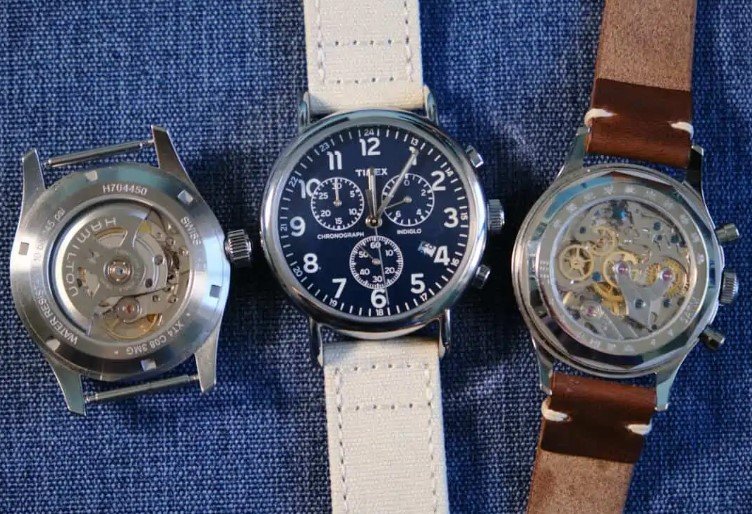Watches have always been a symbol of class and elegance, and nowadays, they also have become a fashion statement. With so many different types of watches on the market, it’s hard to know which one to choose.
Quartz and automatic watches are two popular types of watches that many people wonder about. Both have their pros and cons, but which one is better? In this article, we’ll take a closer look at these two types of watches to help you decide which one is right for you.
What are quartz watches?
Quartz watches are watches that use quartz crystals to keep time, and the crystal oscillates at a precise frequency when an electrical current is passed through it. This is why quartz watches are also referred to as electronic watches.
The battery powers the watch, and it sends electrical signals to move the watch’s hands. Quartz watches are known for their accuracy and low maintenance. Here are some of the advantages of quartz watches:
- Accurate timekeeping.
- They are Low maintenance compared to automatic watches.
- Affordable prices, great for someone on a budget.
- Precision. Quartz watches measure time to the nearest second.
Despite its accuracy, people are divided about quartz watches because they lack the “soul” of an automatic watch. Quartz watches are viewed as unexciting and uninspiring compared to the charm and beauty of automatic watches.
What are automatic watches?
Automatic, or mechanical watches, are watches that operate by using a wound spring that releases energy to move the watch’s gears, which ultimately controls the hands’ movement. The second hand of an automatic watch will sweep around the dial, creating that smooth and mesmerizing ticking sound.
Automatic watches keep going as long as they are being worn, thanks to the movement of the owner’s wrist that winds the spring. Here are some of the advantages of automatic watches:
- They offer timeless and classic vintage appeal.
- They are high-quality, jewel movements that are artfully crafted.
- Automatic watches are unique and collectors’ item.
- They maintain their value over time.
However, automatic watches usually come at higher prices than quartz watches because of the labor-intensive nature of their production. They also tend to require regular maintenance, which can be costly.

Quartz vs. Automatic: Accuracy
When it comes to accuracy, quartz watches are known to be the more accurate of the two types. Quartz watches have a deviation of fewer than 15 seconds per month, while most mechanical watches have a deviation of between five and ten seconds per day.
This is because the quartz crystal oscillates at a precise frequency, while mechanical watches rely on finer gearwork that can be affected by external factors such as temperature or shock.
Quartz vs. Automatic: Maintenance
Maintenance is another factor to consider when choosing between the two types of watches. Quartz watches are low-maintenance and require minimal upkeep. All they need is a battery change every few years. On the other hand, automatic watches are mechanical and require more upkeep.
The movement inside them requires periodic cleaning and oiling, which should be done every three to five years. Automatic watches may also run slower or faster as they age, which means they need periodic adjustments if the watch has a date or perpetual calendar function.
Quartz vs. Automatic: Lifestyle
When it comes to choosing between these two types of watches, it is essential to consider your lifestyle. Quartz watches are perfect for people who lead busy lives as they require less attention. They are also suitable for sports activities as they are stronger and can withstand more wear and tear.
In contrast, automatic watches usually need more attention and are best worn on special occasions or as part of your elegant attire. They are not recommended for sports activities or daily use.
Quartz vs. Automatic: Investment
When choosing a watch, it is essential to consider the investment. Automatic watches are still viewed as a good investment as they usually maintain their value over time, and some vintage pieces even increase in value.
This is not usually the case with quartz watches, which tend to lose their value over time as new technology comes along. If you are buying a watch with the intention of selling it later, you may want to consider an automatic watch instead of a quartz watch.
Conclusion:
The decision to choose between a quartz or automatic watch comes down to personal preference and lifestyle. If you want a watch that is durable, accurate, and low maintenance, then a quartz watch is the best choice for you.
However, suppose you are looking for a classic and timeless watch that you can cherish and wear on special occasions. In that case, an automatic watch may be the right choice for you. At the end of the day, it depends on your lifestyle, budget, and personality.
FAQ
1. What is the difference between quartz and automatic watches?
Quartz watches use a battery-powered quartz crystal to keep time, while automatic watches rely on a wound spring that releases energy to move the watch’s gears. Quartz watches are known for their accuracy and low maintenance, while automatic watches offer a timeless and classic vintage appeal.
2. Are quartz watches more accurate than automatic watches?
Yes, quartz watches are known to be the more accurate of the two types. Quartz watches have a deviation of fewer than 15 seconds per month, while most mechanical watches have a deviation of between five and ten seconds per day.
3. Do automatic watches require more maintenance than quartz watches?
Yes, automatic watches require more maintenance than quartz watches. The movement inside them requires periodic cleaning and oiling, which should be done every three to five years. Automatic watches may also run slower or faster as they age, which means they need periodic adjustments if the watch has a date or perpetual calendar function.
4. Are quartz watches suitable for sports activities?
Yes, quartz watches are perfect for people who lead busy lives as they require less attention. They are also suitable for sports activities as they are stronger and can withstand more wear and tear.
5. Are automatic watches a good investment?
Yes, automatic watches are still viewed as a good investment as they usually maintain their value over time, and some vintage pieces even increase in value. This is not usually the case with quartz watches, which tend to lose their value over time as new technology comes along.















